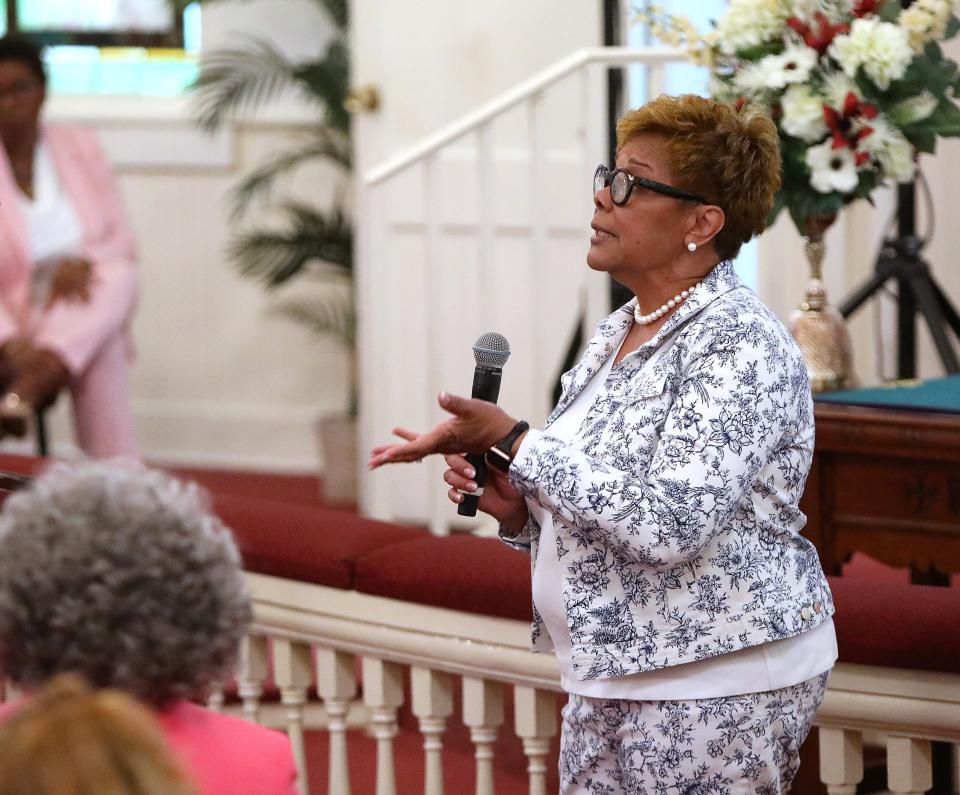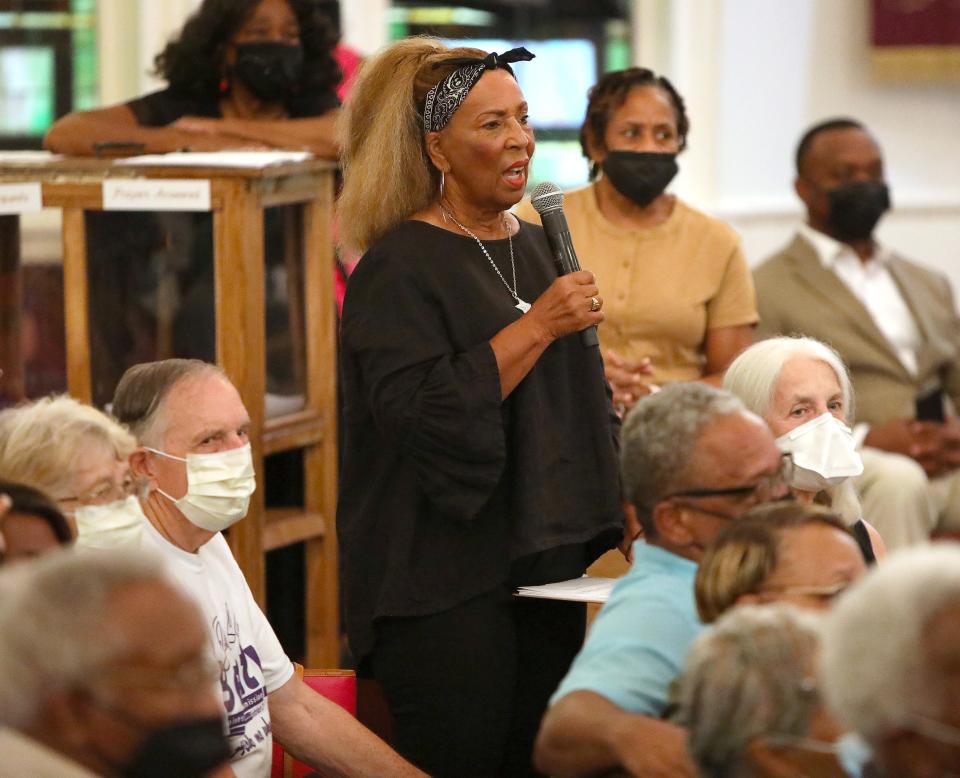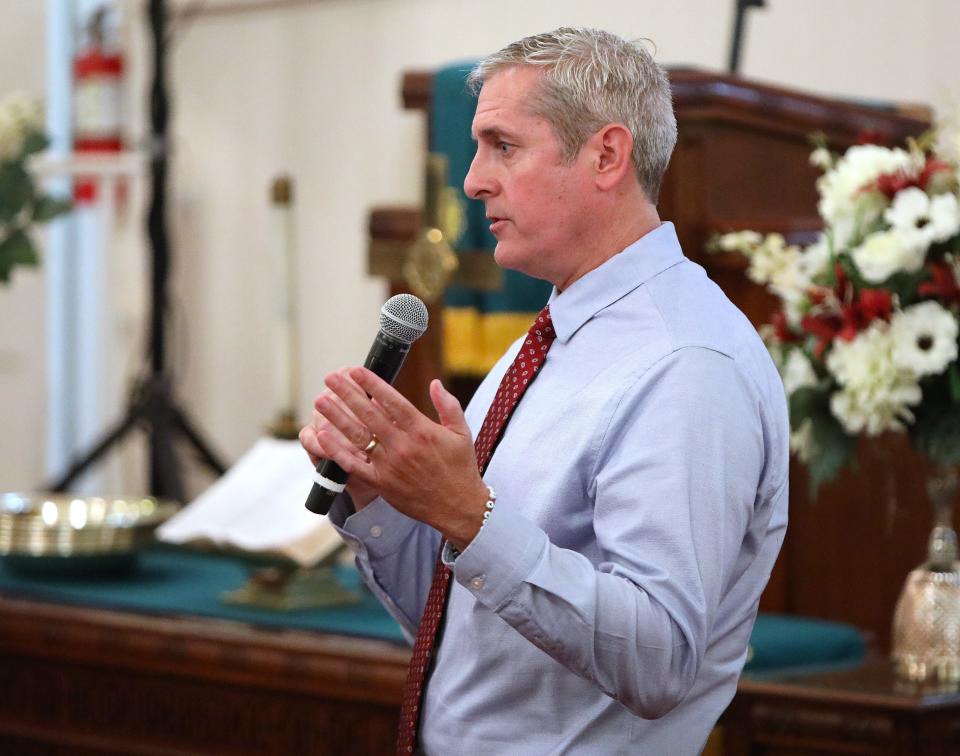Exclusionary zoning, high GRU bills among issues debated at Gainesville town hall event
Close to 150 people packed the Mount Pleasant United Methodist Church sanctuary Thursday evening to discuss a host of hot-button issues facing Gainesville that have left residents feeling outraged and ignored.
Following a recent vote by the Gainesville city commission to eliminate single-family zoning throughout the city, Commissioner Cynthia Chestnut called for a town hall meeting at the church, giving concerned residents a larger venue to gather and engage with city officials.
“I must say (exclusionary zoning) has taken over the campaign for city commissioners and it’s all that anybody is talking about in town,” Chestnut said. “I wanted you to have an opportunity to ask your questions and to be heard."
First vote: Gainesville commission gives first OK to elimination of exclusionary zoning with 4-3 vote
Protest: Gainesville residents take over city meeting to protest elimination of exclusionary zoning
More: What you need to know about the debate over exclusionary zoning in Gainesville
The event comes after last week's split vote for Gainesville to become the first in the state to eliminate single-family zoning, allowing multi-family units to be built anywhere in the city. Roughly 100 people showed up to protest the zoning change, while only a dozen showed up in support.
It was the first of two needed votes for the change to take effect. It also needs state approval, though two local legislators have already asked for it to be denied.
Only about 30 people at a time were allowed in the commission chambers during the meeting, leaving many standing outside in the heat or in an overflow room inside City Hall.

Chestnut said she wanted to create a space for more people to discuss the recent vote.
In attendance were a slate of city officials, including interim City Manager Cynthia Curry, Gainesville Regional Utilities General Manager Tony Cunningham and the city's sustainable development director, Andrew Persons.
“When the city talks about exclusionary zoning, it’s within three categories – things that limit the supply of housing, things that increase the cost of building new housing and regulations that limit the use of existing housing,” Persons said.
Commissioners who supported the zoning and plan change said it allows a slight increase in density in single-family neighborhoods and could create more housing units to help with the affordable housing problem over time.
They attribute the origins of the city's zoning laws to racist policies set during the desegregation era.
Some residents, however, starkly disagree.
“We keep being told that this is all about affordable housing,” said Wendy Fray, a resident of the Fletcher Heights neighborhood. “I have not heard one thing about how building more houses and ruining our neighborhoods is going to make it more affordable for anybody.”

The controversial vote comes as residents prepare to hit the polls for the primary election on Aug. 23. Chants like “vote them out” rang through the church, despite each of the three of the four commissioners who supported the change being term-limited. One supporter, David Arreola, is running for mayor.
“The commissioners that were on the losing side of this vote are interested in affordable housing,” Chestnut said. "What we wanted was to have this start with affordable housing, address affordable housing. Define it. (Ask) where do we need to go, how many do we need to build? That’s not where it started. That is a reason you need to know who you vote for on August 23."
GRU Estimating Bills
Beyond the issues of exclusionary zoning and affordable housing, residents also expressed outrage over the rising cost of their GRU bills.
The municipal-owned utility in June had the second highest electric bills in the state, according to a report from the Florida Municipal Electric Association, ranking higher than Duke Energy and Florida Power and Light.
“I’ve heard by way of the great vine in Azalea Trials that the reason our utility bills are so high is because they don’t have enough meter readers,” said Carrie Parker-Warren, of the Azalea Trials neighborhood. “So, do we have somebody sitting downtown in an office, guesstimating how much our light bills are?
High bills: GRU has the 2nd highest residential bills in Florida. Here's how to keep costs down
More: Fact check: Did the Gainesville City Commission really estimate GRU bills at 35 days?
Cunningham acknowledged that GRU has a shortage of meter readers, which has caused longer-than-usual billing cycles by a few days, resulting in higher bills. The utility also has said it sometimes estimates bills when necessary but corrects the total for the next bill if usage was overestimated.
“We had a choice to make earlier this summer, which was to allow for those longer billing cycles, which has happened, or do what we call an estimated read,” said Cunningham, as “boos” could be heard coming from the crowd.

“What an estimated read is we look at your average use, estimate what we think that typically would be and then the next month we get an actual read and it’s trued up to what you actually used over those two months.”
Cunningham later invited attendees to see if they would be interested in becoming meter readers to help the problem. He said that GRU hires a few new employees every couple weeks.
Regardless of the billing cycle, some in the crowd were content with the answers, as GRU has historically teetered around the top five most expensive utilities in Florida.
Parker-Warren said her bill is more than $400, despite living alone. GRU bills, unlike some others, also include water and wastewater.
Cunningham attributed the latest increases to the spike in the cost of natural gas.
"Since last summer, natural gas has tripled in price and with the tripling of that price, that charge goes to the customer,” he said. “The other thing happening is, essentially, people are using a lot more power than we did last month or even last year."
Following a string of questions and comments from frustrated residents about single-family zoning and GRU rates, most of the room appeared to agree with Chestnut who said. "I think what tonight has shown us more than anything else is that we’re not ready (to implement this zoning change), we need more players at the table."
This article originally appeared on The Gainesville Sun: Gainesville town hall event on zoning, GRU show residents frustrated

